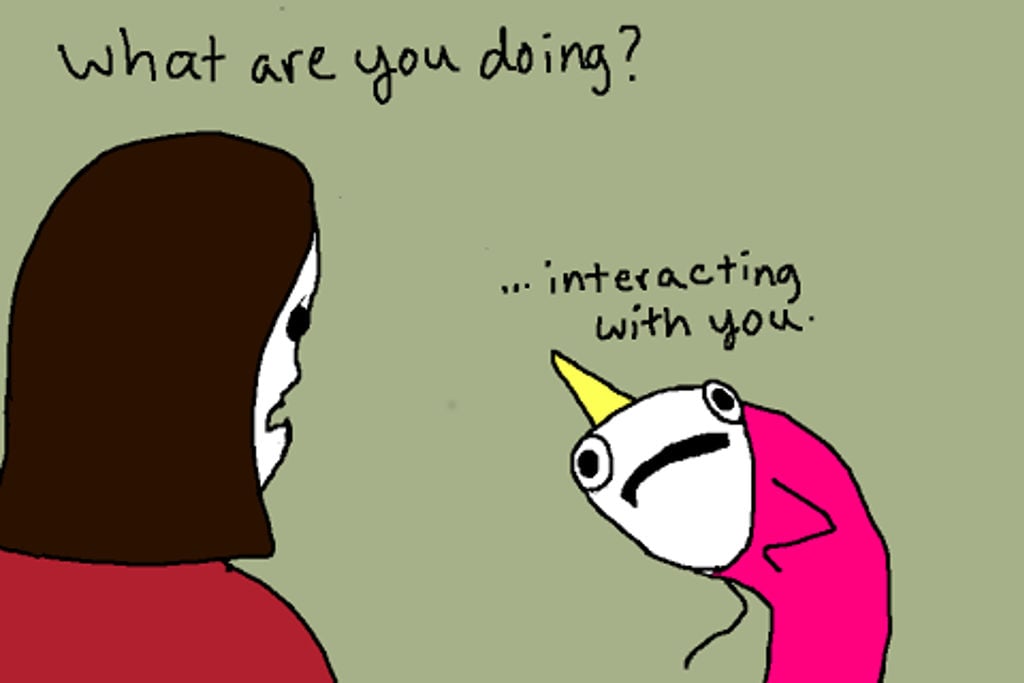How Can We Be There For People Who Suffer From Mental Illness?
If someone you’re close to is struggling, here are some tips on how to be there for them.

Since Robin William’s tragic suicide, we’ve seen a lot of discussion around bipolar disorder, depression, and other mental illnesses that may or may not lead to suicidal thoughts. From Alex McKinnon’s brilliant piece on why we should be talking about this, to Mary Hamilton’s important discussion about media coverage on the topic, there’s a lot of momentum right now to address the stigma around depression and suicide.
For depressed people, like myself, this is a very good thing.
But there are still many people out there who don’t know how to join the conversation. As we’ve seen with Henry Rollins and Gene Simmons, this can lead to some momentous screw-ups. But more often, for most people who don’t suffer from depression, it’s less about what they do say, and more about their hesitance to say anything at all.
It’s really hard to have these important conversations, especially if you have no experience of what depression is like — because what do you even say? But if someone you know and love has depression, anxiety, or another form of mental illness, the important thing is to not let the difficult nature of the subject keep you from being supportive.
NB: This isn’t intended to be a definitive guide. It’s just another part of a long and important discussion about a very difficult topic. Respectful and constructive comments are welcome to keep this conversation going.
–
Do your research: understand what depression is, and what suicide is about
Depression, bipolar disorder, anxiety, and other forms of mental illness are medically diagnosed medical conditions that each have various medical treatments available. You can read more about different types of mental illnesses and their symptoms here.
After Robin Williams’ death, a lot of ill-informed comments added to the stigma that depression is not a medical condition but a sign of weakness, and that suicide is “selfish” or an “easy way out”. Also unhelpful were the op-eds, which set out “logical” reasons for “why people should not kill themselves”, like Do Not Link To Sam De Brito Dot Com, and of course Henry Rollins’ proclamation that “choosing to kill yourself, rather than to be there for that child, is every shade of awful”. (As far as famous peoples’ apologies go, it was good to see the latter recognise and own his mistakes.)
Let’s get one thing straight: people who are feeling suicidal know exactly how bad it is. And what the consequences are. And that they shouldn’t be thinking about it. But there is shit going on in their head and their heart and their soul that makes it seem less like a choice, and more like the only option.
Lifeline Australia has this to say about why people may think about suicide:
“Suicide seems like the only way out of their situation or the feelings they are experiencing. They generally feel very alone and hopeless. They believe nobody can help them or understand what they are going through.”
You can try to be the understanding person they need.
Beyondblue, Lifeline, Suicide Prevention Australia and other organisations have a wealth of information, with specific sections for friends/family/carers to learn about depression and suicide (see further resources listed below).
Another important resource can be stories of lived experience that put words to these awful feelings. One of the best known (and loved), is Stephen Fry:
–
Understand the stigma around mental illness, so you don’t fall into those traps
The myths around depression and suicide are part of the reason why people are afraid to open up about their problems and get help. They don’t want people thinking that they:
- need to snap out of it – they can’t;
- are lazy and should HTFU – they’re trying all the time;
- are selfish and causing a fuss and don’t deserve help – they already think much worse things about themselves.
Due to these myths around mental illness, people hide from what should be their support network, and feel trapped and alone in a very awful, dark place. It’s comments like Henry Rollins’ that make people think they’ll be judged and pilloried for being weak and selfish, which then makes them feel EVEN WORSE THAN THEY ALREADY DID HOW IS THAT EVEN POSSIBLE OH GODS.
TL;DR: Stigma about depression and suicide causes prejudice and discrimination, which leads to a vicious cycle of self-stigma, and reluctance to seek help.
Suicide Prevention Australia has developed a really important position statement on stigma, which should be required reading to anyone who gives a shit about this stuff: read it here.
–
Don’t keep telling them to go for a run
Unless you are a Mental Health Scientist, you are not a Mental Health Scientist; you might wish you had all the answers, but you probably don’t.

Even if you click on all these links, and read every page you can find about depression, you’re still not qualified to tell your depressed friend about how good exercise will make them feel. Also, your friend has heard that a million times, and IT IS JUST REALLY HARD TO GET OUT OF BED RIGHT NOW FOR NO PARTICULAR REASON AND YES I ALREADY FEEL SHIT ABOUT THAT TOO.
Or maybe that’s just me. Anyway.
–
Be a friend
Your role in supporting a friend or loved one who has depression isn’t to treat them. There are professionals who have studied for a long time and get paid to do that very important work. You won’t be able to fix it, you won’t be able to make them better overnight, and you will feel helpless most of the time.
But for the rest of the time, you can listen. And maybe you can help them feel a tiny bit less shit that they did five minutes ago.

Pro tip: don’t ask them WHY they are feeling like shit. Again, Stephen Fry says it best:
“If you know someone who’s depressed, please resolve never to ask them why. Depression isn’t a straightforward response to a bad situation; depression just is, like the weather.
Try to understand the blackness, lethargy, hopelessness, and loneliness they’re going through. Be there for them when they come through the other side. It’s hard to be a friend to someone who’s depressed, but it is one of the kindest, noblest, and best things you will ever do.”
–
Ask questions about how they are feeling, but don’t expect answers
There are some gentle ways of approaching the issue. A stack of people all over the internet have written from their perspective of having depression, and some have even suggested useful starter questions for having these conversations – such as basic enquiries about what has been going on today. Frankly, “R U OK? Day” should be every day.
There are also plenty of professional resources on mental health and suicide first aid that can be useful; we’ve linked to a few of them below.
However, it’s important to remember that your friend might not be ready to talk just yet. They might genuinely need to just be alone right now. If that is the case, don’t hound them. Let them know you will be there whenever they feel like talking, ready to listen rather than to judge — or just to drink beer and talk about TV if that’s what they want to do.
–
Be prepared for the answers
This is the scariest part: when the stark reality of the situation comes out. If you are going to be a good friend and ask those questions, you need to be able to handle the worst possible responses.
Lifeline’s three steps to prevent suicide are:
1) Ask
If you think someone might be suicidal, ask them directly “Are you thinking about suicide?” Don’t be afraid to do this, it shows you care and will actually decrease their risk because it shows someone is willing to talk about it. Make sure you ask directly and unambiguously.
2) Listen and stay with them
If they say ‘yes’, they are suicidal, listen to them and allow them to express how they are feeling. Don’t leave them alone. Stay with them or get someone else reliable to stay with them.
3) Get help
Get them appropriate help. Call a crisis line like Lifeline 13 11 14 or 000 if life is in danger. If you can get in straight away visit a GP or psychologist. Even if the danger is not immediate they may need longer term support for the issues that led to them feeling this way.
–
In summary:
- Learn about depression and suicide.
- Listen.
- Don’t judge.
- Listen.
- Don’t try to “fix” everything.
- Listen.
- Be there without being pushy.
- Did we mention listening? Do that.
- Know the crisis line numbers.
–
Resources for friends and family:
- Read Beyondblue’s Family and Friends resources
- Check out Lifeline’s 3-steps to prevent suicide, and toolkits on:
- Consider doing a Suicide First Aid course – you can also contact the Lifeline office in your state for more information about formal training in this area
- Read Suicide Prevention Australia position statement on Overcoming-the-Stigma-Of-Suicide [PDF]
- Lifeline and Beyondblue have national helpline numbers, but also check out other numbers in your state: like the Samaritans (WA), local hospitals etc, and keep them handy
Share all of the above with everyone, everywhere — both on social media and in 3D.
–
If you suffer from depression, you can reach Lifeline 24 hours a day on 13 11 14.
–
Sunili is a lawyer and a freelance writer/and editor with interests in human rights, diversity in popular culture, and napping. She currently lives in Jakarta, and tweets from @sunili
Feature image by Allie Brosh, for Hyperbole and a Half: ‘Depression Part II‘